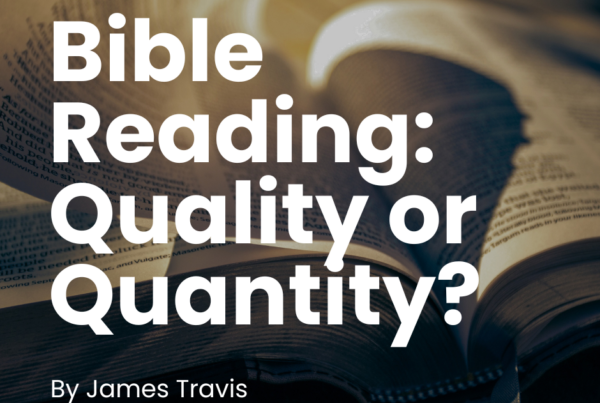
I’ve been a Calvary Chapel pastor for over a quarter century. In the last 25 plus years, I’ve personally observed Pastor Chuck embrace the desire to display grace and truth. I’ve seen our movement attempt to firmly lay hold of both pillars of grace and truth. I have received abundant grace and truth. And I have attempted to discover, declare and display grace and truth in my life and ministry.
Through the years, I have observed and gained some wisdom and perspective on both Christ and man. I have learned that the truly rich theological and philosophical phrase, grace and truth, is incredibly difficult to actually live by. In my anecdotal observations, Jesus’ followers (and His shepherds), tend to lean towards either grace or truth. Most of us are unaware or unwilling to consider the idea that we have fallen from the tightrope of grace and truth and landed unintentionally in “either or,” rather than “both and.”
Here are four messy essential realities about grace and truth gleaned from John 1:14-17:
1. It requires dwelling: The incarnation of Christ manifests grace and truth by “dwelling among.”
“And the Word became flesh and dwelt among us, and we beheld His glory, the glory as of the only begotten of the Father, full of grace and truth” (John 1:14). Declaring biblical truth among my Christian friends in a small group or on social media or even the platform I’m blessed to speak, as a pastor, is significantly easier than “dwelling among.” I am to dwell with people in a world that is generally characterized by a misunderstanding of the reality of God and His nature. And I also am to dwell among people that replace moralism and legalism for the gospel.
I was raised in an observant Jewish home. God has uniquely blessed my people: We are a covenant people, custodians of the Scriptures, primary light bearers and a chosen people to bring forth the Messiah. I speak with and dwell with relatives that I love, and they are biblically illiterate, blasphemous, moralistic, hedonistic, pluralistic and materialistic (not unlike the people all around us). They make an off-hand remark like, “I believe in God, and He or She …” Then it is real, and then it is messy. My flesh is not full of grace and truth. My theology and philosophy are sure, but how I manifest them in practice when I “dwell among” is the challenge. I can either bemoan their misunderstanding of God, condemn it, be frustrated by it or actually be full of grace and truth.
Do you dwell among people with a different worldview? Do you know your neighbors where you live, work and play? Do you know their worldview? How do you befriend and build relationships with them? Or have you simply created a perceived Christian enclave with people who generally share your biblical worldview? “Dwelling among” is messy stuff.
2. It declares Christ: “Declaring Christ” may be distinct from declaring a biblical truth.
“John bore witness of Him and cried out, saying, “This was He of whom I said, ‘He who comes after me is preferred before me, for He was before me.’” (16). To reflect grace and truth I “declare Christ.” John the Baptist pointed to Jesus “…As the Lamb of God who takes away the sin of the world”(29). He told his disciples, “Behold the Lamb …” I must reveal Christ. They are to see Jesus. My declaration of truth is not adequate, “The law was given through Moses” (17). Jesus reveals grace and truth to sinners. Tax collectors and prostitutes, proud and religious, male and female, Jew and Gentile, rich and poor alike. Jesus comforted and confronted them all.
Do I declare Christ and love people who are separated from Him? Do I treat liars and covetous people differently than homosexuals? Do I declare a scriptural truth, but fail to declare Jesus?
3. It is deep: Jesus is “full of grace and truth.”
Through Jesus, we have access to “grace for grace.” The supply of God’s grace and truth available in Christ is “deep.” It is deep beyond my imagination, and it reveals how shallow the supply I offer is. Being gracious with people and truthful is, in reality, incredibly messy. Yet, we tend to appease ourselves that we are full of grace and truth, because we try to forgive, and we seek to live and declare sound doctrine.
There are three great idols that tend to obscure grace and truth, the desire for control, significance and comfort. A desire for control rears its ugly head when I utter truth to control behavior. A quest for significance causes me to use truth to manipulate or exploit so that my agenda (on God’s behalf) is pursued. A yearning for comfort causes me to disguise my discomfort in confronting sin as being gracious. When these idols are at work, grace and truth are limited. The supply becomes shallow.
Do I have a seemingly unlimited supply of grace and truth? Or does one side tend to flow more freely from the springs of my heart?
4. It is deliberate: Both “grace and truth came through Jesus Christ.”
We recognize the reality that He is the source, and that His life and teaching reveal and reflect God’s immeasurable grace and truth (18). The revelation of grace and truth should stir us to yearn to know him more and display Him more day by day. Without being deliberate and intentional, I will lean towards one or the other. I can become a spring that brings forth grace or truth rather than both grace and truth.
Sometimes my tendency to lean towards one side or the other can be revealed by my perception of others. Am I quick to label them as liberal (too gracious) or legalistic (too truthful) when they may in fact be within the boundaries of God’s standard, but simply different than me? Am I willing to be “deliberate?” Will I consider whether I am leaning towards one side and possibly minimizing or neglecting the other? Will I ask those who know me, “Do I seem to lean towards either grace or truth?” Will I listen to them without being defensive if I don’t like their response? Will I strive to submit to Christ, and receive His correction, so that His grace and truth flow from me?
How have you discovered messy realities of grace and truth?









